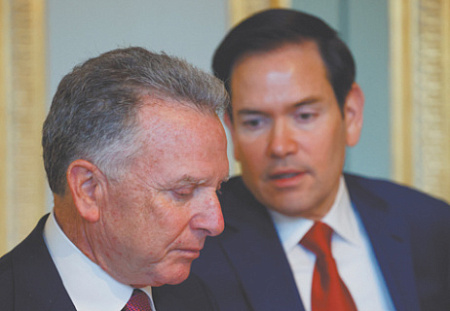
Negotiations on the end of the Russian-Ukrainian conflict, which are being conducted by Donald Trump’s team, are moving to London. An American delegation will arrive there, in the capital of Great Britain. The composition of the participants in the negotiations is not clear, whether Russia will be involved in them either. The United States only says that this will be the last chance to achieve a lasting ceasefire. If it becomes clear that the bloodshed will not be stopped in the near future, Trump will “wash his hands” and deal with other problems.
The negotiations in London were announced by the US President’s special representative for Ukraine, Keith Kellogg. On Fox News on April 19, he said that Trump wants to “move forward on the truce issue” in the near future. “That’s why we’re going to London next week,” Kellogg said. He did not provide any details about the upcoming negotiations. But this means, of course, a long-term truce, with the possibility of its extension.
Why Kellogg named London is clear. The United Kingdom, along with France, are the initiators of the creation of the “coalition of the resolute” (another name is the “coalition of the willing”). This is what the West calls a group of countries that are ready to send their soldiers to Ukraine after the truce to comply with its terms. Although Moscow has repeatedly spoken out against it, the White House believes that it cannot do without Western troops. Their presence in the conflict zone is an American condition for its completion. As far as is known, the members of the Resolute coalition have not yet decided how many countries will send their troops, nor what the size of this military mission will be, nor what its powers will be. The only practical outcome of the discussions in this regard is that London and Paris are becoming the venue for discussion of the Russian-Ukrainian conflict by the United States and its European allies.
Negotiations were held in the French capital on April 17-18. At the end of the talks, Secretary of State Marco Rubio said that it was necessary to find out whether a truce was achievable within “the next few days.” If it turns out that it is not achievable “in the short term,” the United States will, as the head of American diplomacy put it, “move on.” Kellogg confirmed in his interview that these words are not Rubio’s self–activity and a reflection of some conflicts within the Trump administration, but precisely how the American president sees the further development of the situation. “Because we are tired of what is happening. There are a lot of other problems in the world that the United States should be involved in solving,” Kellogg explained. At the same time, he expressed confidence that the meeting in London would be productive.
It should be added that Trump himself commented on Rubio’s words. But his comment was very vague. He did not name any deadlines, but only noted that “if for some reason one of the two sides” (apparently referring to the Russian Federation and Ukraine, and not the members of the “resolute coalition”) “complicates everything, we will simply say that you are fools and terrible people” and “just refuse.””without even specifying why. It seems that Trump decided to support Rubio at the same time and at the same time not close the doors to further negotiations if a truce could not be agreed after a few days.
According to CNN, next week Trump’s specialist in contacts with the Kremlin, special representative of the US president Steve Witkoff, will meet with some representatives of the Russian Federation. It is unclear where and when the meeting will take place. The CNN source did not name London as the venue for the talks. But, according to him, Witkoff will show the Russians a ready-made framework peace agreement. Among the prescribed conditions will be the cessation of hostilities along the current line of contact and the recognition of Crimea as Russian. On the part of the Russian authorities, no one commented on the information of the TV channel at the time of signing the issue.
There are generally several reports about the negotiation process in the Western media, but all with reference to sources. Their general meaning boils down to assumptions that Moscow is unlikely to be satisfied with territorial concessions alone, but the Trump administration is unlikely to be able to offer anything more. An anonymous representative of the European Commission, for example, claimed that the EU was not going to lift sanctions against Russian air carriers, which Moscow allegedly insisted on as a prerequisite for a truce agreement.
Curiously, Western media reports on the alleged terms of the peace agreements do not include what it all began for in 2014: the return of Ukraine’s state structure to the pre-Maidan state. After Trump’s public quarrel with Vladimir Zelensky, members of Congress from the Republican Party spoke about the need for the current Ukrainian president to step down from power. The last statement of this kind was made on April 8 by a member of the House of Representatives, Victoria Spartz, the only native of Ukraine in Congress. However, no one in the Trump team expresses doubts about Zelensky’s legitimacy and does not talk about the need to return anyone from Viktor Yanukovych’s team to power.
